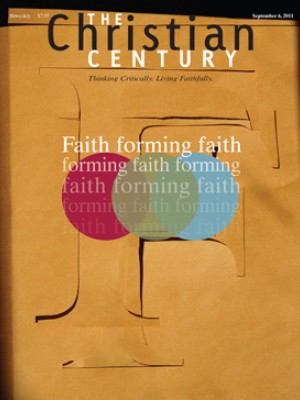Faith forming faith: Learning from new Christians

Kathryn was in her forties when she first came to our congregation. She said she was looking for "something spiritual." As it happened, we had something specific to offer her: a place in our catechumenate. For 15 years, the congregation had offered a yearlong intentional time of faith formation. As a result, a loving sponsor, a caring catechist and a committed congregation walked alongside Kathryn as she explored what it means to follow Jesus.
The catechumenal process includes weekly meetings on Sunday evening. After a family-style meal, candidates and their sponsors gather into small groups for Bible study. These sessions focus on the preaching text for Sunday morning, on the life of faith that is modeled in the scriptures and on the questions that inquirers bring: Who is Jesus? What is prayer, and why pray? How do the stories of scripture apply to my life?
Read our latest issue or browse back issues.
In Lent, the candidates and their sponsors stand before the congregation each Sunday to receive the community's prayers and support. They receive gifts representing Christian worship and formation—a hymnal, a copy of the creed and a catechism. These public rites offer candidates the final opportunity for discernment prior to being baptized or renewing their baptism at the Easter Vigil.
Soon after Kathryn was baptized, the congregation held a forum to consider inviting Tent City to spend three months encamped on the church's front lawn, beginning just a few weeks before Christmas. Tent City is a well-organized long-standing coalition of self-governing homeless people who have banded together for safety, community and advocacy. They refer to themselves as "houseless," not "homeless."
The city of Seattle permits the hundred or so residents of Tent City to encamp within the city limits, but only at places to which they have been invited and for no longer than 90 days in any one spot. It has fallen largely to the churches of Seattle to be the advocates and hosts of Tent City.
The possibility of our church hosting Tent City was raised the previous spring, after some kids in the church and their parents had taken a field trip to a neighboring church that was hosting Tent City. On the way home, a still, small voice spoke through the mouth of a third-grader: "Pastor, when can we have Tent City at our church?"
Six months later, the idea of hosting Tent City was gaining momentum, but it was by no means obvious that we would do this. Our well-manicured block-long property on the summit of Phinney Ridge is one of the few green spaces in the neighborhood. Even the most imaginative and liberal proponent of the gospel understood that people living in adjoining million-dollar-view homes would not instantly embrace our invitation to the houseless.
In preparation for the forum and in expectation of hearing well-reasoned and well-intentioned objections to hosting Tent City, the staff and leadership had discussed our strategy: be good listeners, remain nonanxious, offer insights, don't get into a power struggle. Most of all, point to the mandates of scripture and stay grounded in the treasure of our Lutheran theology—God's unconditional grace for all. We had even gone so far as to rehearse responses to those who might threaten to leave our congregation, should we choose to move ahead and invite our brothers and sisters in Christ who live in Tent City to join us for the holy days of Christmas and into a new year.
We hadn't prepared ourselves, however, for the newly baptized Kathryn. After listening to the conversation at the congregational forum, Kathryn stood and took a deep breath.
"I can't believe the objections that I'm hearing to this opportunity," she said. "I can't believe them because, as I was preparing for my baptism last year, this is what you told me that being a baptized child of God would mean. You told me that to be a disciple of Christ meant to care for those less fortunate—to reach out to those in need and to share God's love with all people. That's what you taught me it means to be a baptized disciple of Jesus."
Then Kathryn said the most amazing thing of all, the thing that none of us had anticipated hearing and for which none of us had rehearsed a response.
"So if we decide that we can't invite Tent City to be on our front lawn, I will have to leave this congregation. If Tent City can't be here, then I can't either, because what you have taught me about who we are as the people of God and what it means to be one of you will not be true."
The room fell silent. For all intents and purposes, the conversation was over. To be sure, there were still opponents to address and details to be worked out. But in that single moment of testimony, God spoke to us through Kathryn. As 1 Corinthians 5:17 promises, the old had passed away and the new had come. In Christ we were made a new creation. The voice of that third-grader three months prior was now amplified by the voice of a new adult child of God.
Had Phinney Ridge Lutheran Church not been a congregation practicing the adult catechumenate, we would not have been ready to reach out and welcome Tent City. Nor would we have been ready to welcome Harrison.
Harrison hadn't been to church in years. He came at the advice of his oncologist. Having been diagnosed with pancreatic cancer, his doctor counseled that he "get his affairs in order." Among other things, this meant for Harrison a reexamination of a long-abandoned faith.
Harrison too found a place in our catechumenate. Recruiting an appropriate sponsor for Harrison was a challenge of pastoral care. His sponsor would need to be someone solid in his own faith, loving and caring in skills of listening and support and emotionally well balanced. We knew that the human bonds that were forged in this relationship would soon be torn apart by death. Walter was the perfect choice. He had himself come into our congregation recently and had made the year- long walk of faith formation.
It certainly is the case that all of us are dying. But Harrison's participation as a catechumen that year brought an intensified poignancy and urgency to contemplating death, especially among those who were preparing for baptism. For those sitting side by side with him in Sunday evening Bible studies, the words typically used to describe baptism had an added edge. Consider St. Paul's teaching in Romans 6: if we have died with Christ, we believe that we will also live with Christ. And again, so you also must consider yourselves dead to sin and alive to God in Jesus Christ.
By the time that Harrison affirmed his baptism, nine months after first coming to our church and asking for our help in preparing him for all that lay ahead of him, he was surrounded by a community of faith that knew him, loved him and supported him in ways that none of us could have imagined beforehand. Months later, a year after he first stepped into our assembly for worship, the community gathered for his funeral and commended not a stranger but a brother in Christ into the care of Almighty God.
All of us who knew him, who walked in the way of Christ with him and who suffered with him, found renewal, hope and strength in that connection. Our journey of faith together, along with our shared prayers, insights, fellowship and service, strengthened our Christian community. What happens in the catechumenal journey permeates our ministry. It is not only the candidates who are formed in faith but all of us, over and over again.
Bringing people to faith through baptismal preparation has been much more than a way to gain new members for the church. It has opened our eyes to a new way of being the people of God. Forming others in faith has formed us for ministry and outreach.
A friend tells the story of a woman who had never before had a relationship with Christ or his body, the church, yet for years she had visited the local jail, simply because she felt called to do it. Through a small group Bible study she came to see her visitation at the jail in a new way: she saw herself ministering because Christ had called her to this ministry.
Meanwhile, the members of her Bible study were learning to take a risk that they had never before taken. At her encouragement, they came with her to the jail. Eventually, the six members of the group became a vibrant ministry in the jail.
This sort of formation—faith forming faith—can happen anywhere. Phinney Ridge is not an extraordinary place. We are a typical neighborhood church facing many of the challenges that affect other congregations a decade into the new millennium. Less than 10 percent of the population around us claims any formal affiliation with a faith community. Fifteen years ago, when we began the practice of forming new Christians for baptismal living, not many congregations believed that their communities of faith could benefit from such a ministry. But the creeping tide of secularism, the growing mistrust of institutionalized faith and the general decline of churches all underscore the importance of having an intentional process of faith formation.
Our catechumenal story is the story of how, through the baptismal preparation of new Christians, we as a congregation are formed in faith and strengthened for mission. We were formed by Kathryn's courage to accept Tent City into our lives. We were formed by getting to know the residents of Tent City, which gave us the courage to look for additional ways to reach out to those in need. And we were formed by Harrison and his humble walk back into the arms of God.
Faith forming faith is a circular miracle. By leaning out in love and trust to those who are seeking Christ, we have discovered what the scriptures have promised us all along. The gifts that one offers in leading a new Christian to baptism are gifts that immerse all of us more richly and fully in the love of God.






